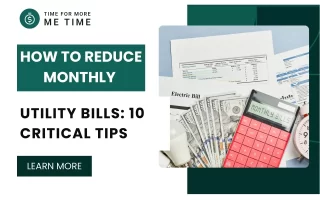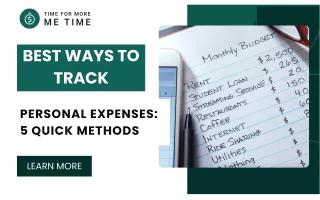Being broke can feel overwhelming. But you can break free from that situation when you know how to save money when you’re broke.
I know it seems impossible, but my journey out of a $90,000 student loan and credit card debt has shown me that even small changes can make a big difference. By finding practical ways to cut expenses, building healthy money habits, and taking on side gigs, I slowly rebuilt my finances.
I’m here to share how to save money when you’re broke. Ready to transform your $25 or less into a safety net that may change your financial situation? Keep reading!
1. Understand Your Financial Situation
Before you can start saving, it’s crucial to understand your financial situation fully—a lesson I learned firsthand while working my way out of serious debt.
When I gained clarity on where my money goes, I discovered hidden saving opportunities that empowered me to make confident choices. To do that, here are a few steps to get a clear picture of your finances, so you can start building a secure foundation right now.
Assessing Your Income and Expenses
The first step in understanding your finances is to take a close look at your income and expenses. At first, you might feel uncomfortable, especially if you’ve been avoiding facing your financial reality.
However, it’s a necessary step towards improvement. This will allow you to create a good credit score in the long run.
Start by listing all your sources of income: regular paycheck, any side hustles, government benefits, or other forms of financial support you receive. Be thorough and include even small amounts—every dollar counts when you’re trying to save money.
Next, track your monthly expenses: housing, utilities, transportation, healthcare, debt payments, entertainment, personal care, and even small, everyday purchases. Use a spreadsheet or a budgeting app to categorize your expenses.
Once you have a clear picture of your income and expenses, you can start to identify areas where you might be overspending. This information will be crucial as we move forward with frugal living tips when you’re out of cash.
Setting Financial Goals
Now that you have a clearer understanding of your financial situation, it’s time to set some goals. When you’re broke, the idea of money-saving methods might seem daunting, but having clear, achievable goals can help motivate you to make positive changes.
Start with short-term goals. These are objectives you want to achieve within the next few months:
Create an emergency fund of $500.
Pay off a small debt.
Cut your monthly grocery bill by 10%.
Long-term goals are also important. But when you’re learning money-saving tips on a tight budget, it’s crucial to focus on immediate, achievable targets first. As you start to see progress with your short-term goals, you can begin to think about longer-term objectives, such as:
Building a 3-6 month emergency fund.
Saving for a down payment on a house.
Planning for retirement.
Remember, the key is to set realistic and achievable targets, following the SMART method. It’s better to start small and build momentum than to set overly ambitious goals that leave you feeling discouraged.
2. Practical Tips on How to Save Money When You’re Broke
With a clear understanding of your finances, it’s time to explore practical ways to save money that truly works when you’re on a tight budget. These tried-and-true strategies helped me find smart ways to cut costs and build savings from the ground up.
Check these effective methods that will stretch your budget and help you reach your financial goals.
Create a Budget
Creating a budget is essential to taking control of your finances, but not all budgets are effective. To make sure yours truly works, check out my guide on “Is Your Budget a Joke? How to Draw Up a Budget That Will Work” for tips on building a realistic, results-driven plan.
Cut Unnecessary Expenses
Another crucial tip when you’re learning ways to save when you’re low on cash is to cut unnecessary expenses. Finding practical ways to reduce expenses can help you achieve this. Here are some areas where you might be able to reduce spending:
Subscriptions: Cancel streaming services, gym memberships, or other subscriptions you don’t use regularly.
Dining out: Cook at home more often. One recent US Foods survey revealed that the average American spends $166 monthly on dining out. Cutting this in half could save you nearly $1,000 a year.
Transportation: Consider using public transportation, carpooling, or biking to save on gas and car maintenance costs.
Utilities: Reduce your energy consumption by using energy-efficient appliances and being mindful of your usage.
These are just some of the many ways to lower your expenses. Remember, small savings add up over time. Even saving $5 a day amounts to $150 a month or $1,825 a year.
Use Discounts and Coupons
Another effective strategy? Use discounts and coupons to save even more on everyday purchases of the things you need and want.
With these discounts, you can receive cashback on your purchases, enjoy special offers, and more! If you want to learn how, don’t miss our in-depth article about the best seven coupon apps you can use.
Practice a Minimalist Lifestyle
Adopting a minimalist mindset can be another powerful tool when learning budget hacks for when money is tight. This doesn’t mean living a restrictive life but focusing on what truly brings value to your life.
Want me to do a deep dive into how to become a minimalist? Comment below and let me know! But in a gist, here’s how to get started:
Declutter your space: Go through your belongings and sell or donate items you no longer need or use.
Practice mindful spending: Before making a purchase, ask yourself if it’s truly necessary or if it aligns with your values and goals.
Find free or low-cost activities: Explore your local library, parks, or community centers for entertainment options that don’t cost much.
By focusing on experiences rather than material possessions, you can often find more satisfaction while spending less money.
3. Increase Income
When money is tight, cutting costs can only go so far—sometimes, the best way to grow your bank account is by increasing your income. From side hustles to part-time gigs, I’ve used a range of strategies to bring in extra cash when I needed it most.
In this section, we’ll explore realistic ways to earn more, helping you reach your financial goals faster and with greater ease.
Explore Side Hustles
In today’s gig economy, finding a side hustle to boost your bank account has never been easier. Back when I was juggling multiple side jobs to support myself while finishing my degree, options were limited.
Now, you can earn extra cash from flexible gigs or offering online services. Here are some creative ideas to get you started:
Freelancing: If you have skills in writing, graphic design, programming, or other areas, platforms like Upwork or Fiverr can connect you with clients.
Delivery services: Companies like DoorDash or Instacart allow you to earn money by delivering food or groceries.
Pet sitting or dog walking: Apps like Rover connect pet owners with sitters and walkers.
Tutoring: If you excel in a particular subject, consider offering tutoring services online or in person.
These are only four of the top 10 side hustles that you can do to earn extra money. Remember, the goal is to find something that fits your skills and schedule. The best? Even a few hours a week can make a significant difference in your budget.
Consider Part-Time Work
If a flexible side hustle isn’t quite enough, adding a part-time job can offer steady hours and a reliable paycheck. While side hustles offer flexibility and often align with personal skills, a part-time work provides steady hours and a regular paycheck.
That’s why having a part-time role can also help stabilize your finances even when money is tight. Here are some of them:
Retail or hospitality jobs often offer flexible hours and can be a good fit for evenings or weekends.
Seasonal work, such as holiday retail or summer tourism jobs, can provide a temporary boost to your income.
Customer service roles often allow you to work on a flexible schedule.
When considering part-time work, be sure to factor in any additional costs, such as transportation or childcare. That way, your part-time work is truly beneficial, ensuring that you’re making more than your living expenses.
4. Build Healthy Financial Habits
Learning how to save money when you’re broke isn’t just about short-term tactics. After boosting your income, building healthy financial habits becomes essential to make the most of those extra earnings. Here are some key habits I’ve learned through the years:
Automating Savings
One of the most effective ways to save money is to make it automatic. You only have to set up a direct deposit from your paycheck into a separate savings account. Even if it’s just a small amount to start—say, $10 or $20 per paycheck—it adds up over time.
You may want to do some research on the current high-yield savings rates, before you commit to a certain bank.
Additionally, many banks offer the option to round up your purchases to the nearest dollar. The difference from the rounded dollars? It automatically transfers straight into your savings account—an effortless way to grow your balance little by little.
Educating Yourself
Financial literacy is a crucial skill that’s often overlooked. The more you understand about personal finance, the better equipped you’ll be to make smart decisions with your money. Getting help with financial counseling is also a great option if you feel you need it.
Or you can use the following resources to become more financially literate:
Books: Reading personal finance books is a timeless way to transform your perspective on money, just like how these three books helped a 36-year-old mom earn $10k a month.
Podcasts: If you’re an audio learner, listening to podcasts that offer practical financial advice and inspiring stories is for you.
Online courses: Many universities offer free personal finance courses through online platforms.
You can also subscribe to my page or channel, where I aim to help people become financially literate by collecting and sharing finance-related tips to make it easier for you. Remember, knowledge is power when it comes to managing your money!
5. Make Your Finances Work For You
Now that you’ve increased your income and established healthy financial habits, it’s time to focus on making your finances work for you.
Before, I thought making enough money to cover my bills was enough. But now, I understand that optimizing my finances is crucial for long-term stability and wealth building.
That’s why it’s important to learn how to make your money work for you, regardless of your current financial situation.
Emergency Fund
Setting up an emergency fund can prevent you from relying on high-interest credit cards if you find yourself having to cover unexpected costs.
According to experts, aim to build up 3-6 months of emergency savings for essential living expenses. You can use this safety net as a cushion against job loss or emergencies.
I know this can feel overwhelming, especially if you’re trying to dig your way out of debt while making ends meet on a limited income. Don’t let big-picture advice discourage you. You don’t need thousands of dollars saved up before a ‘real’ emergency occurs.
If your expenses regularly exceed your income, just start saving whatever amount you can manage—every little bit helps!
Research indicates even small amounts of money help mitigate the effects of job loss. Even if your savings range from $250-$749, you can use them to avoid eviction or missing a rent or utility payment.
Households with larger savings had an even easier time, but even $5 per week makes a difference. These small steps can be helpful if you’re living paycheck to paycheck, are on reduced pay, or even if you suddenly lost your full-time job.
Shift to High-Yield Savings Accounts
When researching how to cut costs when funds are low, explore savings options that make your funds grow faster. High-yield savings accounts (HYSA) generally earn a better return than conventional savings products.
This means your money can grow faster, making it easier to build up savings over time, even with small deposits.
Say you open a high-yield savings account (HYSA) with an interest rate of 4.2% annually.
If you deposit $25 a month, by the end of the year, you’ll have saved $300. With the 4.2% interest, you’d earn around $6.30, bringing your total to approximately $306.30.
In contrast, a regular savings account with a 0.01% interest rate would only earn you about $0.03 in interest, totaling $300.03. The HYSA clearly helps you make the most of your savings.
While it may not seem like a lot, it’s a great start to building an emergency fund or saving for a future goal. And you can achieve that while your money works for you—even when you’re on a tight budget.
FAQs
How Can I Save Money if I am Poor?
Saving money can be challenging when you’re facing a constant cash crunch but every dollar matters. Prioritize saving even small amounts every week—just $5 adds up to over $250 after a year.
Or focus on areas where you’re overspending, such as dining out or frequent coffee shop purchases. Examine all your bills to see where you can cut, even by small amounts.
How to Save $1,000 Fast?
Setting ambitious savings goals is great, but it can be challenging when you’re focused on daily expenses just to make ends meet. Instead of feeling overwhelmed by the idea of a large emergency fund, start by reviewing your weekly spending choices.
For instance, are you still grabbing your favorite iced coffee every day or treating yourself to takeout? By replacing just a few restaurant meals with home-cooked alternatives for a month, you could get close to your $1,000 savings goal while still allowing for occasional treats.
How to Budget if You’re Broke?
Budgeting on a tight income can be stressful, but making a few simple changes in your spending habits can help turn things around. Start by cutting unnecessary items from your budget.
If your funds often come up short, focus on larger monthly expenses like credit card bills or utilities. Call your providers to discuss interest rate reductions, flexible payment plans, or more cost-effective plans you can switch to right away.
Even small adjustments to your cable, electric, cell phone, and internet services can create more room for saving money when you’re broke. If you’re a college student, this is an excellent way to start getting your finances in order.
Conclusion
Understanding how to save money when you’re broke is essential for achieving financial stability.
By looking at your income and expenses and setting clear goals, you can create a budget that fits your needs. Simple strategies like cutting unnecessary costs and finding side hustles can help you earn more money.
Building good financial habits, like automating your savings and learning about money management, will also help you succeed in the long run. Plus, creating an emergency fund and using high-yield savings accounts can make your money grow.
Every small step matters, so start today!
For more tips on taking control of your finances, subscribe to my page or check out my YouTube channel Time for More Me Time for helpful advice and strategies!






